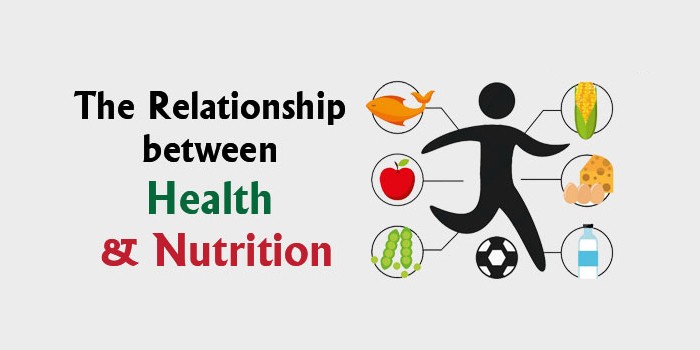
The World Book
Learn, Share & Earn
Book: Health and Fitness

What is the Relationship Between Nutrition and Health?
Author: Nayma Nishat - Researcher, Health & Fitness

Do you know the relationship between nutrition and health is at the heart of scientific research? For around thirty years, many national and international research organizations have focused their research on the relation of nutrition to health.
From my previous discussion, you might have already known What is Health as The World Health Organization (WHO) defines,
“Health is a state of complete physical, mental, and social well-being and not merely the absence of disease or infirmity.” [1]
But most of us think health is only being free from illness. It is not entirely right. A person should be healthy both in terms of physical, mental, and social well-being and not a mere absence of any disease. Then we can say it is a good nutritional status.
There is a strong relationship between nutrition and health, and you’ll want to make the right food choices to ensure you live the best life possible. Discover the many important connections between nutrition and a healthy lifestyle, and how it plays a major role in your life. Before going into details, let’s what is nutrition.
What is Nutrition?
Nutrition is the intake of food in relation to the dietary needs of the body. Good nutrition (a sufficient and balanced diet combined with regular physical exercise) is a fundamental element of good health.

According to WHO,
“Nutrition is the intake of food, considered in relation to the body’s dietary needs. Good nutrition – an adequate, well-balanced diet combined with regular physical activity – is a cornerstone of good health. Poor nutrition can lead to reduced immunity, increased susceptibility to disease, impaired physical and mental development, and reduced productivity.” [2]
Hippocrates, the Father of medicine says,
“Let food be thy medicine and medicine be thy food.” [3]
So, good nutrition indicates the right amount of nutrients for proper utilization for achieving the highest level of health.
There are six different types of nutrients in foods. They are,
- Carbohydrates,
For a healthy body, we require all these six important nutrients. Carbohydrates, proteins, and fats are majorly required for bodybuilding and energy; the minerals and vitamins are required for the protection of our body and they give us resistance against the different illnesses and also they required for carrying out the metabolic actions in the body and keeping the body healthy. And water is a very important nutrient which keeps our body healthy.
- Relationship between Nutrition and Health
Good nutrition is the key to leading a healthy lifestyle. We can improve our health if we take care of ourselves. Eating a balanced diet is an important part of good health. We should eat foods that contain six important nutrients which include whole grains , a source of protein, dairy, fruits, vegetables, and water.

Nutrition plays a role in promoting good health. So we have to be careful about the foods and nutrients which should be emphasized in our diets, and how they can enhance our health. Diets full of fruits and veggies, whole grains, nuts, and lean meats have proven health benefits like lowering blood pressure, improving glucose control in diabetics, weight loss, improving arthritis, and reducing the risk of cancer and cardiovascular events and so on.
We should also learn about the specific nutrients that can impact health. For example,
- Plant pigments [4] found in bright orange and red fruits and vegetables, which may prevent and slow the progression of eye diseases.
- Calcium helps to keep bones strong.
- Vitamin B plays a role in maintaining brain health.
- Flavonoids [5] from many plants may improve the health of our cardiovascular systems.
It’s not surprising that physical activity can help to maintain a healthy weight, improve mood and sleep habits, and boost overall health. And it’s clear that a well-balanced diet, full of nutritious foods is crucial to good health.
We Are What We Eat
Surely you have heard this expression many times: “We are what we eat.”
What goes through your head when you listen to it? They are words with a much more important meaning than is usually thought. We are going to see everything that hides behind this certainty and to pay special attention to everything that it wants to tell us.

Since we are born we need three things to live: oxygen, water, and food”. Food “is fuel” through which we obtain energy and compounds that help us to repair the body.
Once the food is eaten, the feeding ends, and nutrition begins, which we can define as the unconscious and involuntary process by which the body receives and transforms the nutritional substances that we give it through what we eat.
The relationship between food nutrition and health is immense. Food gives us energy and nutrients to live with.
Today there is no doubt that what we eat is key to achieving and maintaining optimal body function, preserving or restoring health, and protecting ourselves against future illnesses.
Also, our eating behavior influences the decisions of those around us. The clearest example is that of the little ones, who will imitate and acquire the eating habits that are followed at home.
In turn, the entire society influences what we eat: food policies, nutritional education campaigns, collective consumption, gastronomic offer, food availability, the food industry, the geographical environment, advertising, and marketing, fashion and we could continue citing countless conditions.
Besides, many pathologies also depend on whose cause is influenced by diet, such as cancer. According to results from over 80,000 new cases of cancer, it is estimated that “30% of cancer is caused by a poor diet”. [6] It can also affect other aspects such as functional brain development or aging.
To avoid this, the first thing we have to follow is “to control the adequate amount of food, and the second is a healthy style of food.” The base of the diet is fruits and vegetables.
We should eat about three fruits a day, “that can mean about 90 thousand fruits in a lifetime”. To this we add vegetables and greens twice a day, fish five times a week, meat four times (one of them red), potatoes twice a week, another two pasta and the same rice.
What do we gain in return? Not being overweight, with which you have already achieved enough because there is no overload in organs such as the heart or liver; slower and healthier aging; in addition to circumstances as obvious as sleep, because with a good diet you sleep better. Even the state of mind, because when you eat better the functionality of the brain is also better.
“We Are What We Eat”, this expression contains a whole motto of life.
Why Good Nutrition is Important for Health?
Good and balanced nutrition is very beneficial for us. Good nutrition means a portion of food that can maintain the required energy balance in our body. If we do not have the energy, we cannot perform well. For good and optimum health, we should be careful about what we are eating, how we are eating, how much we are eating, and what time we are eating.

We have a few limiting factors in our body and by consuming good nutrition we can remove them. Among the limiting factors which come first in our mind is Genetics.
We all have different genes and we have to accept that each and every one is not genetically blessed. For example, some people lose bodyweight very fast and some lose very slowly; some people get good muscles very fast but some are not. This is a genetic factor.
But if we add good nutrition to our food, it allows us to break up this fact and even we can achieve good health. That is why Nutrition is known as a Promoter of Good Health.
Nutrition as a Weapon of Prevention
Numerous studies show that diet is a fundamental pillar in the prevention of diseases. It is one of the most studied factors in chronic diseases, although we cannot forget the determining role of nutrition in the correct functioning of the immune system and greater resistance in acute infectious processes.
Chronic diseases have a long duration and are generally slow in progression. Diabetes, heart attacks, heart disease, cancer, and respiratory diseases are the main causes of mortality in the world, accounting for 63% of deaths.
In 2008, 36 million people died of chronic disease. These are diseases clearly linked to our lifestyle, so we must attend to our way of life in a more committed and conscious way.
The human organism has a magnificent resilience capacity and adapts to the environment that surrounds it to live in harmony, it can tolerate a large number of pathogens or toxic agents if the immune system is strong. However, undernutrition or overnutrition can upset this balance.

We are in an overfed and paradoxically malnourished society. Currently, the food market is very large and offers us various alternatives to consume, therefore, it is more difficult to know what we eat given the reality that most processed foods come with a high content of simple sugars, saturated fat, and sodium Mainly, which has caused various diseases closely associated with the cardiovascular system, increasing the risk of suffering from them.
That is why it is important to know food, since through this we can prevent diseases in the future and, in addition, provide our body with the energy and nutrients necessary to function effectively in our day to day life.
If you are what you eat, would you be a healthy person? Preventing deadly diseases is available to anyone who wants to avoid them. Nutrition is a tool that will take care of your health easily. While it is unlikely that you can prevent or control viruses or bacteria that enter your body, you can provide a strong immune system to help prevent them.
Eating right also prevents obesity and is one of the main reasons for the disease. What few know is that it leads to other conditions such as type 2 diabetes, osteoporosis, stroke, heart disease; among others.
So make a plan what you eat, avoiding eating foods loaded with sugar, fat, and calories; the culprits of adding extra weight to your body, weakening your bones, and making your organs work harder. This automatically puts you at a higher risk for future health problems.
Weapon for prevention, nutrition is probably one of the most valid and effective tools we have to protect our health. Let’s make food a way to enjoy life in a healthy way.
Final Thoughts
Life actually thrives on food. The substances that contain food and on which life depends, are nutrients. They provide the essential substances for the growth and survival of living beings.
The way in which nutrients are constituted in the integral parts of the body and contribute to its functions depends on the physiological and biochemical processes that govern its actions.
Weapon for prevention, nutrition is probably one of the most valid and effective instruments that we have to protect our health. So the Relationship between Nutrition and Health is I think very well understood by all of you.
After having reviewed what it implies, do you think we give the attention and importance to our food it really demands?
What would you do to become more aware of the importance of what you eat at all times?
The bottom line is that you have the power to maintain and improve your health, and reduce your risk of disease. And IT’S NEVER LATE TO MAKE A CHANGE.
References:
- http://www.who.int
- http://emro.who.int
- https://www.drgoodfood.org
- https://www.encyclopedia.com
- https://en.wikipedia.org
- https://www.medscape.com
Select another topic below:
- Introduction
- What is Health?
- History of Health
- Types Of Health
- Social Determinants of Health
- Physical Health – What, Why & How?
- Aspects of Physical Health
- Physical Health Issues
- Physical Activities
- Benefits of Physical Activity
- Physical Health Assessment
- Physical Examination
- What is Mental Health?
- Mental Health Disorders
- Pilates Definition
- Pilates Machine
- Pilates Reformer
- 20 Easy Pilates Exercises for Beginners
- 10 Best Pilates Reformer Exercises
- The 8 Best Pilates Reformer with Tower
- 15 Professional Pilates Reformer Machines
- Best Pilates Machine for Home Use
- Best Pilates Reformer for Studio
- How Much Does A Pilates Reformer Cost?
- The 5 Best Professional Pilates Chair
- The 7 Best Professional Pilates Mats
- The 7 Best Spine Corrector Pilates Equipment
© 2022 The World Book. All Rights reserved.
Founder: Nayma Nishat
- - Google Chrome
Intended for healthcare professionals
- Access provided by Google Indexer
- My email alerts
- BMA member login
- Username * Password * Forgot your log in details? Need to activate BMA Member Log In Log in via OpenAthens Log in via your institution

Search form
- Advanced search
- Search responses
- Search blogs
- News & Views
- Food and mood: how do...

Food and mood: how do diet and nutrition affect mental wellbeing?
Read our food for thought 2020 collection.
- Related content
- Peer review
This article has a correction. Please see:
- Food and mood: how do diet and nutrition affect mental wellbeing? - November 09, 2020
- Joseph Firth , research fellow 1 2 ,
- James E Gangwisch , assistant professor 3 4 ,
- Alessandra Borsini , researcher 5 ,
- Robyn E Wootton , researcher 6 7 8 ,
- Emeran A Mayer , professor 9 10
- 1 Division of Psychology and Mental Health, Faculty of Biology, Medicine and Health, Oxford Road, University of Manchester, Manchester M13 9PL, UK
- 2 NICM Health Research Institute, Western Sydney University, Westmead, Australia
- 3 Department of Psychiatry, Columbia University Vagelos College of Physicians and Surgeons, New York, USA
- 4 New York State Psychiatric Institute, New York, NY, USA
- 5 Section of Stress, Psychiatry and Immunology Laboratory, Institute of Psychiatry, Psychology and Neuroscience, Department of Psychological Medicine, King’s College London, London, UK
- 6 School of Psychological Science, University of Bristol, Bristol, UK
- 7 MRC Integrative Epidemiology Unit, Oakfield House, Bristol, UK
- 8 NIHR Biomedical Research Centre, University Hospitals Bristol NHS Foundation Trust and University of Bristol, Bristol, UK
- 9 G Oppenheimer Center for Neurobiology of Stress and Resilience, UCLA Vatche and Tamar Manoukian Division of Digestive Diseases, UCLA, Los Angeles, CA, USA
- 10 UCLA Microbiome Center, David Geffen School of Medicine, UCLA, Los Angeles, CA, USA
- Correspondence to: J Firth joseph.firth{at}manchester.ac.uk
Poor nutrition may be a causal factor in the experience of low mood, and improving diet may help to protect not only the physical health but also the mental health of the population, say Joseph Firth and colleagues
Key messages
Healthy eating patterns, such as the Mediterranean diet, are associated with better mental health than “unhealthy” eating patterns, such as the Western diet
The effects of certain foods or dietary patterns on glycaemia, immune activation, and the gut microbiome may play a role in the relationships between food and mood
More research is needed to understand the mechanisms that link food and mental wellbeing and determine how and when nutrition can be used to improve mental health
Depression and anxiety are the most common mental health conditions worldwide, making them a leading cause of disability. 1 Even beyond diagnosed conditions, subclinical symptoms of depression and anxiety affect the wellbeing and functioning of a large proportion of the population. 2 Therefore, new approaches to managing both clinically diagnosed and subclinical depression and anxiety are needed.
In recent years, the relationships between nutrition and mental health have gained considerable interest. Indeed, epidemiological research has observed that adherence to healthy or Mediterranean dietary patterns—high consumption of fruits, vegetables, nuts, and legumes; moderate consumption of poultry, eggs, and dairy products; and only occasional consumption of red meat—is associated with a reduced risk of depression. 3 However, the nature of these relations is complicated by the clear potential for reverse causality between diet and mental health ( fig 1 ). For example, alterations in food choices or preferences in response to our temporary psychological state—such as “comfort foods” in times of low mood, or changes in appetite from stress—are common human experiences. In addition, relationships between nutrition and longstanding mental illness are compounded by barriers to maintaining a healthy diet. These barriers disproportionality affect people with mental illness and include the financial and environmental determinants of health, and even the appetite inducing effects of psychiatric medications. 4

Hypothesised relationship between diet, physical health, and mental health. The dashed line is the focus of this article.
- Download figure
- Open in new tab
- Download powerpoint
While acknowledging the complex, multidirectional nature of the relationships between diet and mental health ( fig 1 ), in this article we focus on the ways in which certain foods and dietary patterns could affect mental health.
Mood and carbohydrates
Consumption of highly refined carbohydrates can increase the risk of obesity and diabetes. 5 Glycaemic index is a relative ranking of carbohydrate in foods according to the speed at which they are digested, absorbed, metabolised, and ultimately affect blood glucose and insulin levels. As well as the physical health risks, diets with a high glycaemic index and load (eg, diets containing high amounts of refined carbohydrates and sugars) may also have a detrimental effect on psychological wellbeing; data from longitudinal research show an association between progressively higher dietary glycaemic index and the incidence of depressive symptoms. 6 Clinical studies have also shown potential causal effects of refined carbohydrates on mood; experimental exposure to diets with a high glycaemic load in controlled settings increases depressive symptoms in healthy volunteers, with a moderately large effect. 7
Although mood itself can affect our food choices, plausible mechanisms exist by which high consumption of processed carbohydrates could increase the risk of depression and anxiety—for example, through repeated and rapid increases and decreases in blood glucose. Measures of glycaemic index and glycaemic load can be used to estimate glycaemia and insulin demand in healthy individuals after eating. 8 Thus, high dietary glycaemic load, and the resultant compensatory responses, could lower plasma glucose to concentrations that trigger the secretion of autonomic counter-regulatory hormones such as cortisol, adrenaline, growth hormone, and glucagon. 5 9 The potential effects of this response on mood have been examined in experimental human research of stepped reductions in plasma glucose concentrations conducted under laboratory conditions through glucose perfusion. These findings showed that such counter-regulatory hormones may cause changes in anxiety, irritability, and hunger. 10 In addition, observational research has found that recurrent hypoglycaemia (low blood sugar) is associated with mood disorders. 9
The hypothesis that repeated and rapid increases and decreases in blood glucose explain how consumption of refined carbohydrate could affect psychological state appears to be a good fit given the relatively fast effect of diets with a high glycaemic index or load on depressive symptoms observed in human studies. 7 However, other processes may explain the observed relationships. For instance, diets with a high glycaemic index are a risk factor for diabetes, 5 which is often a comorbid condition with depression. 4 11 While the main models of disease pathophysiology in diabetes and mental illness are separate, common abnormalities in insulin resistance, brain volume, and neurocognitive performance in both conditions support the hypothesis that these conditions have overlapping pathophysiology. 12 Furthermore, the inflammatory response to foods with a high glycaemic index 13 raises the possibility that diets with a high glycaemic index are associated with symptoms of depression through the broader connections between mental health and immune activation.
Diet, immune activation, and depression
Studies have found that sustained adherence to Mediterranean dietary patterns can reduce markers of inflammation in humans. 14 On the other hand, high calorie meals rich in saturated fat appear to stimulate immune activation. 13 15 Indeed, the inflammatory effects of a diet high in calories and saturated fat have been proposed as one mechanism through which the Western diet may have detrimental effects on brain health, including cognitive decline, hippocampal dysfunction, and damage to the blood-brain barrier. 15 Since various mental health conditions, including mood disorders, have been linked to heightened inflammation, 16 this mechanism also presents a pathway through which poor diet could increase the risk of depression. This hypothesis is supported by observational studies which have shown that people with depression score significantly higher on measures of “dietary inflammation,” 3 17 characterised by a greater consumption of foods that are associated with inflammation (eg, trans fats and refined carbohydrates) and lower intakes of nutritional foods, which are thought to have anti-inflammatory properties (eg, omega-3 fats). However, the causal roles of dietary inflammation in mental health have not yet been established.
Nonetheless, randomised controlled trials of anti-inflammatory agents (eg, cytokine inhibitors and non-steroidal anti-inflammatory drugs) have found that these agents can significantly reduce depressive symptoms. 18 Specific nutritional components (eg, polyphenols and polyunsaturated fats) and general dietary patterns (eg, consumption of a Mediterranean diet) may also have anti-inflammatory effects, 14 19 20 which raises the possibility that certain foods could relieve or prevent depressive symptoms associated with heightened inflammatory status. 21 A recent study provides preliminary support for this possibility. 20 The study shows that medications that stimulate inflammation typically induce depressive states in people treated, and that giving omega-3 fatty acids, which have anti-inflammatory properties, before the medication seems to prevent the onset of cytokine induced depression. 20
However, the complexity of the hypothesised three way relation between diet, inflammation, and depression is compounded by several important modifiers. For example, recent clinical research has observed that stressors experienced the previous day, or a personal history of major depressive disorders, may cancel out the beneficial effects of healthy food choices on inflammation and mood. 22 Furthermore, as heightened inflammation occurs in only some clinically depressed individuals, anti-inflammatory interventions may only benefit certain people characterised by an “inflammatory phenotype,” or those with comorbid inflammatory conditions. 18 Further interventional research is needed to establish if improvements in immune regulation, induced by diet, can reduce depressive symptoms in those affected by inflammatory conditions.
Brain, gut microbiome, and mood
A more recent explanation for the way in which our food may affect our mental wellbeing is the effect of dietary patterns on the gut microbiome—a broad term that refers to the trillions of microbial organisms, including bacteria, viruses, and archaea, living in the human gut. The gut microbiome interacts with the brain in bidirectional ways using neural, inflammatory, and hormonal signalling pathways. 23 The role of altered interactions between the brain and gut microbiome on mental health has been proposed on the basis of the following evidence: emotion-like behaviour in rodents changes with changes in the gut microbiome, 24 major depressive disorder in humans is associated with alterations of the gut microbiome, 25 and transfer of faecal gut microbiota from humans with depression into rodents appears to induce animal behaviours that are hypothesised to indicate depression-like states. 25 26 Such findings suggest a role of altered neuroactive microbial metabolites in depressive symptoms.
In addition to genetic factors and exposure to antibiotics, diet is a potentially modifiable determinant of the diversity, relative abundance, and functionality of the gut microbiome throughout life. For instance, the neurocognitive effects of the Western diet, and the possible mediating role of low grade systemic immune activation (as discussed above) may result from a compromised mucus layer with or without increased epithelial permeability. Such a decrease in the function of the gut barrier is sometimes referred to as a “leaky gut” and has been linked to an “unhealthy” gut microbiome resulting from a diet low in fibre and high in saturated fats, refined sugars, and artificial sweeteners. 15 23 27 Conversely, the consumption of a diet high in fibres, polyphenols, and unsaturated fatty acids (as found in a Mediterranean diet) can promote gut microbial taxa which can metabolise these food sources into anti-inflammatory metabolites, 15 28 such as short chain fatty acids, while lowering the production of secondary bile acids and p-cresol. Moreover, a recent study found that the ingestion of probiotics by healthy individuals, which theoretically target the gut microbiome, can alter the brain’s response to a task that requires emotional attention 29 and may even reduce symptoms of depression. 30 When viewed together, these studies provide promising evidence supporting a role of the gut microbiome in modulating processes that regulate emotion in the human brain. However, no causal relationship between specific microbes, or their metabolites, and complex human emotions has been established so far. Furthermore, whether changes to the gut microbiome induced by diet can affect depressive symptoms or clinical depressive disorders, and the time in which this could feasibly occur, remains to be shown.
Priorities and next steps
In moving forward within this active field of research, it is firstly important not to lose sight of the wood for the trees—that is, become too focused on the details and not pay attention to the bigger questions. Whereas discovering the anti-inflammatory properties of a single nutrient or uncovering the subtleties of interactions between the gut and the brain may shed new light on how food may influence mood, it is important not to neglect the existing knowledge on other ways diet may affect mental health. For example, the later consequences of a poor diet include obesity and diabetes, which have already been shown to be associated with poorer mental health. 11 31 32 33 A full discussion of the effect of these comorbidities is beyond the scope of our article (see fig 1 ), but it is important to acknowledge that developing public health initiatives that effectively tackle the established risk factors of physical and mental comorbidities is a priority for improving population health.
Further work is needed to improve our understanding of the complex pathways through which diet and nutrition can influence the brain. Such knowledge could lead to investigations of targeted, even personalised, interventions to improve mood, anxiety, or other symptoms through nutritional approaches. However, these possibilities are speculative at the moment, and more interventional research is needed to establish if, how, and when dietary interventions can be used to prevent mental illness or reduce symptoms in those living with such conditions. Of note, a recent large clinical trial found no significant benefits of a behavioural intervention promoting a Mediterranean diet for adults with subclinical depressive symptoms. 34 On the other hand, several recent smaller trials in individuals with current depression observed moderately large improvements from interventions based on the Mediterranean diet. 35 36 37 Such results, however, must be considered within the context of the effect of people’s expectations, particularly given that individuals’ beliefs about the quality of their food or diet may also have a marked effect on their sense of overall health and wellbeing. 38 Nonetheless, even aside from psychological effects, consideration of dietary factors within mental healthcare may help improve physical health outcomes, given the higher rates of cardiometabolic diseases observed in people with mental illness. 33
At the same time, it is important to be remember that the causes of mental illness are many and varied, and they will often present and persist independently of nutrition and diet. Thus, the increased understanding of potential connections between food and mental wellbeing should never be used to support automatic assumptions, or stigmatisation, about an individual’s dietary choices and their mental health. Indeed, such stigmatisation could be itself be a casual pathway to increasing the risk of poorer mental health. Nonetheless, a promising message for public health and clinical settings is emerging from the ongoing research. This message supports the idea that creating environments and developing measures that promote healthy, nutritious diets, while decreasing the consumption of highly processed and refined “junk” foods may provide benefits even beyond the well known effects on physical health, including improved psychological wellbeing.
Contributors and sources: JF has expertise in the interaction between physical and mental health, particularly the role of lifestyle and behavioural health factors in mental health promotion. JEG’s area of expertise is the study of the relationship between sleep duration, nutrition, psychiatric disorders, and cardiometabolic diseases. AB leads research investigating the molecular mechanisms underlying the effect of stress and inflammation on human hippocampal neurogenesis, and how nutritional components and their metabolites can prevent changes induced by those conditions. REW has expertise in genetic epidemiology approaches to examining casual relations between health behaviours and mental illness. EAM has expertise in brain and gut interactions and microbiome interactions. All authors contributed to, read, and approved the paper, and all the information was sourced from articles published in peer reviewed research journals. JF is the guarantor.
Competing interests: We have read and understood BMJ policy on declaration of interests and declare the following: JF is supported by a University of Manchester Presidential Fellowship and a UK Research and Innovation Future Leaders Fellowship and has received support from a NICM-Blackmores Institute Fellowship. JEG served on the medical advisory board on insomnia in the cardiovascular patient population for the drug company Eisai. AB has received research funding from Johnson & Johnson for research on depression and inflammation, the UK Medical Research Council, the European Commission Horizon 2020, the National Institute for Health Research (NIHR) Biomedical Research Centre at South London and Maudsley NHS Foundation Trust, and King’s College London. REW receives funding from the National Institute for Health Research Biomedical Research Centre at the University Hospitals Bristol NHS Foundation Trust and the University of Bristol. EAM has served on the external advisory boards of Danone, Viome, Amare, Axial Biotherapeutics, Pendulum, Ubiome, Bloom Science, Mahana Therapeutics, and APC Microbiome Ireland, and he receives royalties from Harper & Collins for his book The Mind Gut Connection. He is supported by grants from the National Institute of Diabetes and Digestive and Kidney Diseases, and the US Department of Defense. The views expressed are those of the authors and not necessarily those of the organisations above.
Provenance and peer review: Commissioned; externally peer reviewed.
This article is part of series commissioned by The BMJ. Open access fees are paid by Swiss Re, which had no input into the commissioning or peer review of the articles. T he BMJ thanks the series advisers, Nita Forouhi, Dariush Mozaffarian, and Anna Lartey for valuable advice and guiding selection of topics in the series.
This is an Open Access article distributed in accordance with the Creative Commons Attribution Non Commercial (CC BY-NC 4.0) license, which permits others to distribute, remix, adapt, build upon this work non-commercially, and license their derivative works on different terms, provided the original work is properly cited and the use is non-commercial. See: http://creativecommons.org/licenses/by-nc/4.0/ .
- Friedrich MJ
- Johnson J ,
- Weissman MM ,
- Lassale C ,
- Baghdadli A ,
- Siddiqi N ,
- Koyanagi A ,
- Gangwisch JE ,
- Salari-Moghaddam A ,
- Larijani B ,
- Esmaillzadeh A
- de Jong V ,
- Atkinson F ,
- Brand-Miller JC
- Seaquist ER ,
- Anderson J ,
- American Diabetes Association ,
- Endocrine Society
- Towler DA ,
- Havlin CE ,
- McIntyre RS ,
- Nguyen HT ,
- O’Keefe JH ,
- Gheewala NM ,
- Kastorini C-M ,
- Milionis HJ ,
- Esposito K ,
- Giugliano D ,
- Goudevenos JA ,
- Panagiotakos DB
- Teasdale SB ,
- Köhler-Forsberg O ,
- N Lydholm C ,
- Hjorthøj C ,
- Nordentoft M ,
- Yahfoufi N ,
- Borsini A ,
- Horowitz MA ,
- Kiecolt-Glaser JK ,
- Fagundes CP ,
- Andridge R ,
- Osadchiy V ,
- Martin CR ,
- O’Brien C ,
- Sonnenburg ED ,
- Sonnenburg JL
- Rampelli S ,
- Jeffery IB ,
- Tillisch K ,
- Kilpatrick L ,
- Walsh RFL ,
- Wootton RE ,
- Millard LAC ,
- Jebeile H ,
- Garnett SP ,
- Paxton SJ ,
- Brouwer IA ,
- MooDFOOD Prevention Trial Investigators
- Francis HM ,
- Stevenson RJ ,
- Chambers JR ,
- Parletta N ,
- Zarnowiecki D ,
- Fischler C ,
- Sarubin A ,
- Wrzesniewski A
- Harrington D ,

IMAGES